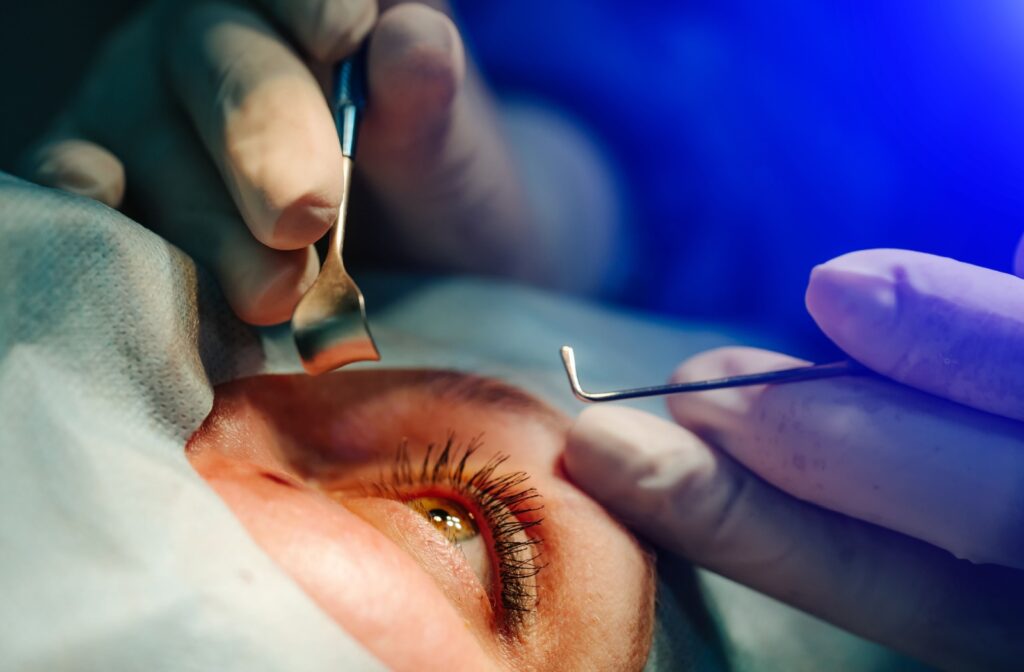Cataract surgery offers hope to those who have suffered from cloudiness, diminished color perception, and the overall compromised quality of life that cataracts bring.
This procedure, which involves the removal of the eye’s clouded lens and its replacement with a clear artificial lens, promises a significant enhancement in vision for millions globally every year. However, amidst the success stories and the promise of regained clarity, some patients find themselves experiencing foggy vision in the aftermath of what was supposed to be their path to visual clarity.
At Total Vision Campbell, we understand the concerns and questions that may arise post-cataract surgery. Foggy vision, while typically temporary, can cause confusion and worry. It’s important to remember that this phenomenon is often a part of the body’s natural healing process.
Our dedicated team of eye care professionals is committed to guiding our patients through their recovery, making sure that they are both informed and comfortable every step of the way.
What is Cataract Surgery?
Cataract surgery is a medical procedure used to treat cataracts, where the natural lens of the eye becomes cloudy and impairs vision. Before the surgery, we’ll conduct a thorough eye exam to ensure your eyes are suitable for the procedure. While cataract surgery is generally safe for most individuals, certain conditions may impact your eligibility, such as:
- Dry eye syndrome
- Eye infections
- Other eye diseases
- Unusually large pupils
- General health concerns
If cataract surgery is deemed appropriate for you, we will then arrange for a specialist surgeon to carry out the operation.
What to Expect?
During the surgery, numbing drops will be applied to your eyes to minimize any discomfort. You might still feel some pressure at this stage.
The surgeon will make a tiny cut in your eye to reach the cataract-affected lens behind the iris. Depending on the situation, the lens may be removed in one piece or first broken down with an ultrasound device before being extracted.
An artificial intraocular lens will then be inserted in place of your natural lens, aiming to restore your vision to its clear state.
We will schedule several follow-up visits to check on your recovery progress and address any side effects from the surgery. Common side effects include:
- Dry eyes
- Glare and halos around lights
- Sensitivity to light
- Blurred vision
- Mild eye discomfort
These symptoms generally improve over time. A frequent side effect encountered is posterior capsule opacification (PCO), where the lens capsule left behind during surgery becomes cloudy, leading some patients to mistakenly think their cataracts have returned.
PCO isn’t very common, but if it occurs, a YAG laser capsulotomy can be performed to resolve this issue and clear your vision once again.
Who Is Cataract Surgery For?
Cataract surgery is typically recommended for individuals who experience significant vision impairment due to cataracts, affecting their daily activities and quality of life. People who may need cataract surgery include those who:
- Have blurry or cloudy vision
- Experience glare and difficulty seeing in bright light or at night
- Notice faded colors
- Have double vision in one eye
- Require frequent changes in prescription glasses or contacts
- Struggle with daily activities, like reading, working on a computer, or cooking.
The decision to have cataract surgery is usually based on the degree that the cataracts affect a person’s vision and overall quality of life. An eye doctor can assess the severity of the cataracts and recommend whether surgery is the best option.
The Healing Process
First, it’s important to understand that cataract surgery is a significant event for your eye, and like any part of your body that undergoes surgery, it needs time to heal. During the healing period, which can last several weeks, it’s not uncommon to experience various visual disturbances, including foggy vision. This is often due to inflammation and the release of cellular debris inside the eye as it heals.
Adjusting to the New Lens
Your brain needs time to adjust to the new intraocular lens and the different quality of vision it provides. This adjustment period varies from one individual to another and can lead to temporary perception issues, including foggy vision.
What Can You Do?
- Follow post-op instructions: Adhering closely to your surgeon’s post-operative care instructions is crucial. This includes using prescribed medications and attending follow-up appointments.
- Be patient: Remember, it takes time for your eye to fully recover and for your vision to stabilize.
- Stay hydrated and maintain a healthy diet: Proper hydration and nutrition support your body’s healing process.
- Communicate with your doctor: If you have concerns about your vision after surgery, don’t hesitate to contact your ophthalmologist. They can provide reassurance, adjust your treatment plan, or investigate other causes.

Navigating the Path to Improved Vision Post-Cataract Surgery
While foggy vision can be a disconcerting symptom following cataract surgery, it’s often a temporary side effect due to the eye’s natural healing process. However, monitoring your symptoms and maintaining open communication with your eye care provider is essential to make sure your recovery is on the right track. With time and proper care, you can look forward to clear days ahead.
At Total Vision Campbell, our expert team is ready to help you through your recovery after cataract surgery. We use the latest technology and care deeply about your vision and health.
If foggy vision is a problem, don’t wait. Book an appointment with us now. We’ll tackle any issues, offer top-quality care, and support you as you heal. Your vision is important to us, and we’re here to help you see clearly again.



